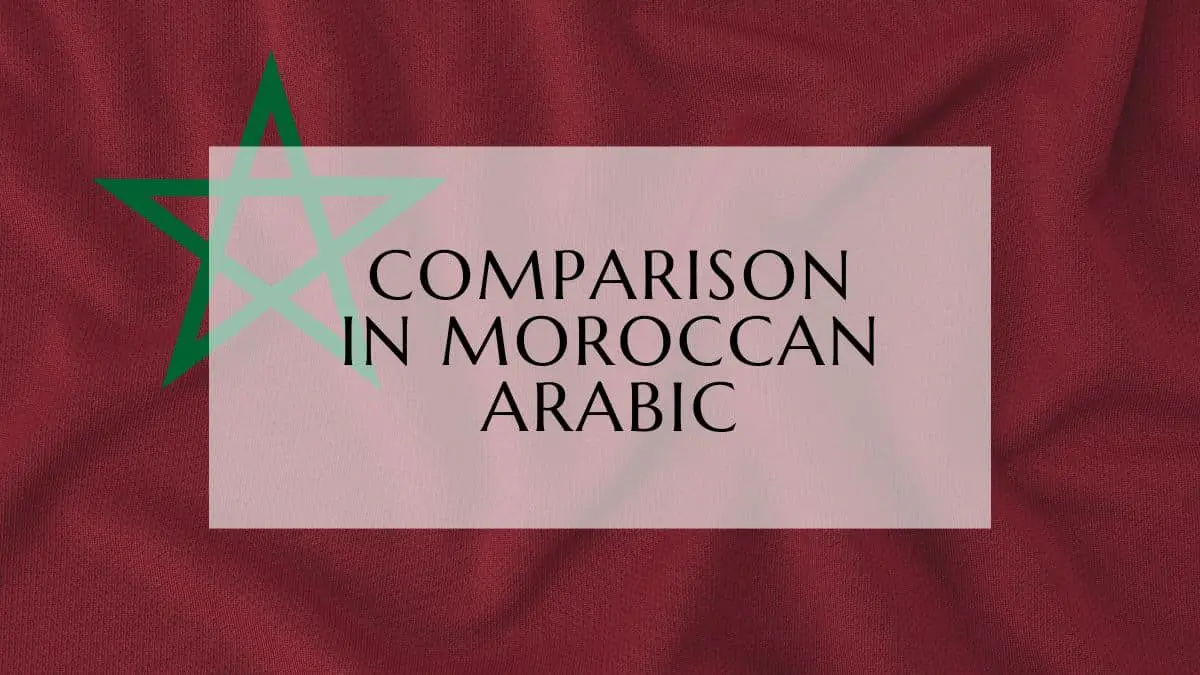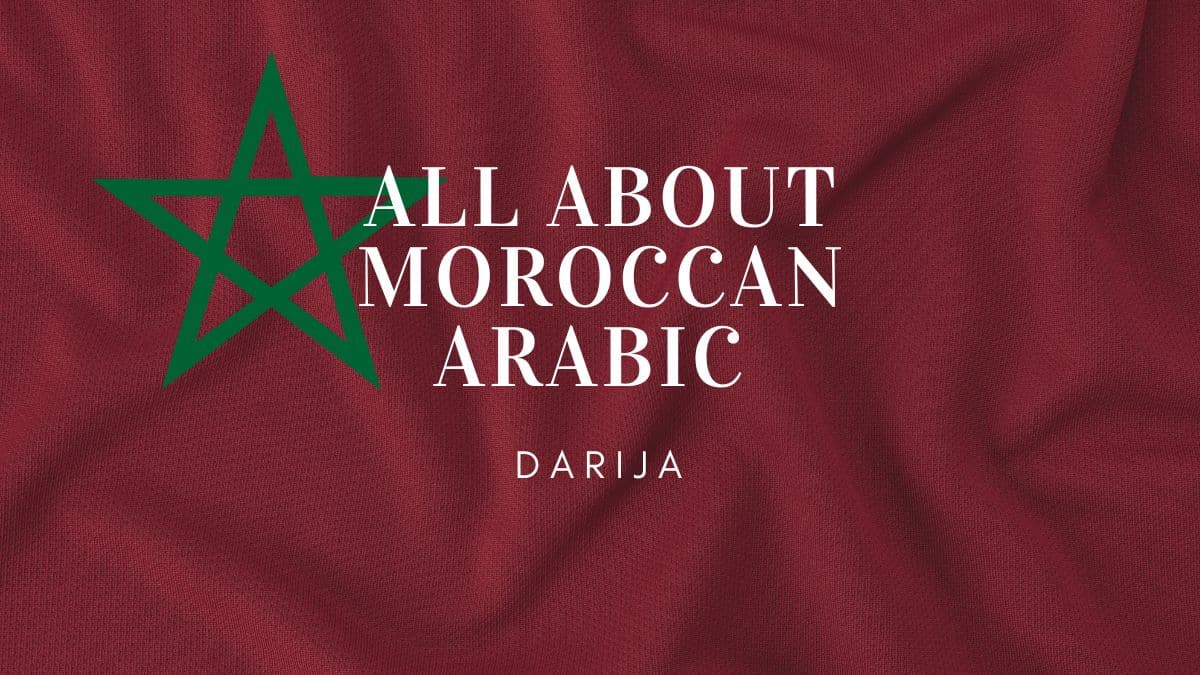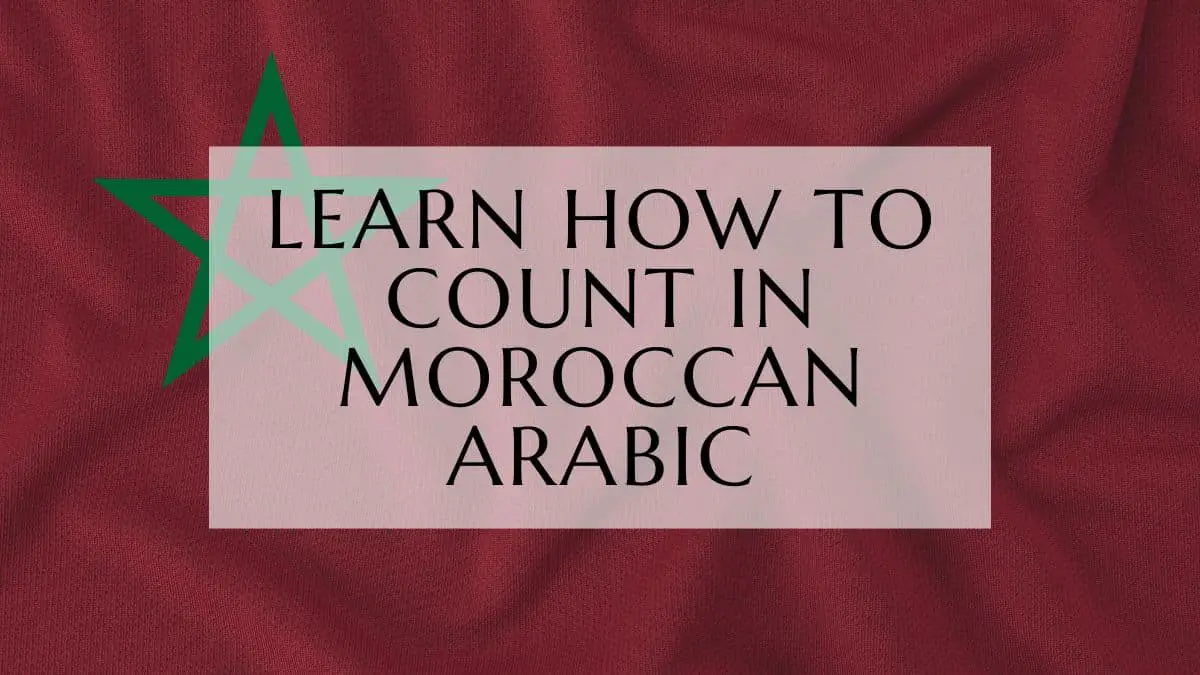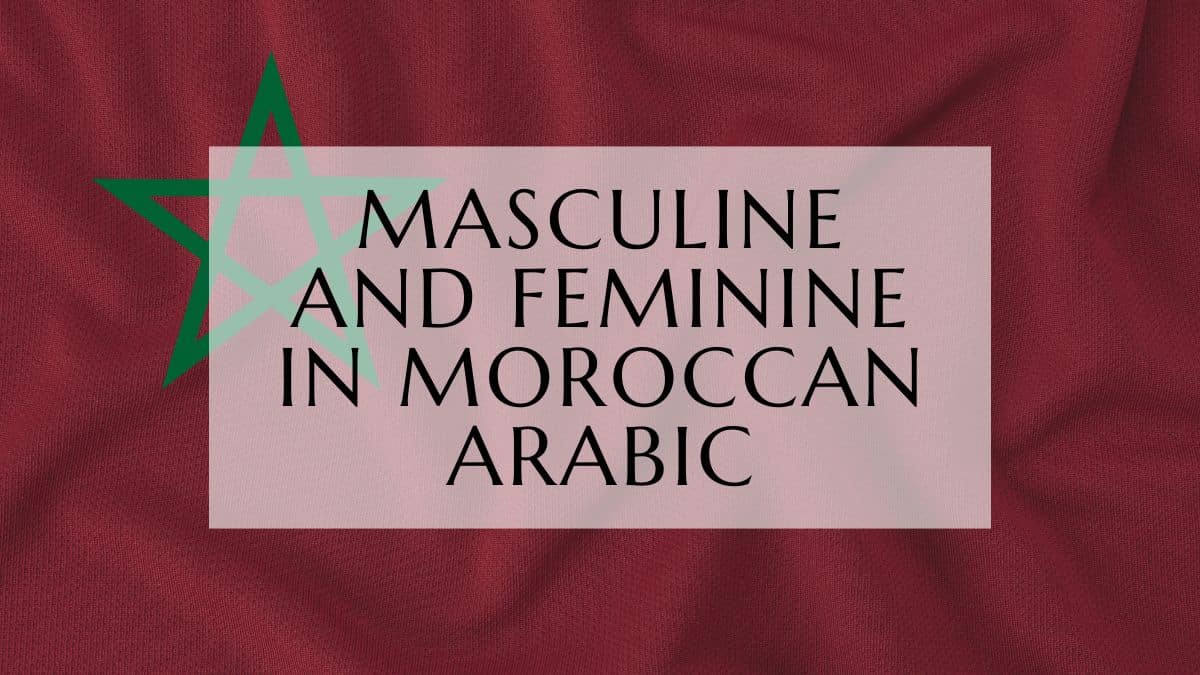In this lesson, we will discuss the comparison in Moroccan Arabic, the comparative and superlative adjectives, followed by examples.

The Comparison In Moroccan Arabic
Comparative Adjectives
Comparative adjectives are used when comparing the quality of the objects (like taller, bigger, faster), they are used in sentences where two nouns are compared using this pattern:
Noun + comparative adjective + mn + noun
For example, ana twl mn Kamal أنا طول من كمال ( I’m taller than Kamal) twl here is the comparative form of the adjective twil, like in twil, the general rule to get the comparative adjective is to remove the long vowel in the original adjective, some adjectives will require adding ktr / كتر (more) after the adjective, like words that start with the letter M (e.g Busy/Meshghul مشغول) note that while using ktr, the adjective must agree with gender and number. Adjectives that end with i will get an A at the end in their comparative form.
Here are the comparative forms for some Darija adjectives:
| Adjective (EN) | Adjective (MA) | Comparative Adjective |
| Amazing | Wa3er/ واعر | W3er/ وعر |
| Angry | M3asseb/ معصب | M3asseb ktr/ معصب كتر |
| Bad | Khayb/ خايب | Khyb/ خيب |
| Beautiful | Zwin/ زوين | Zwin ktr/ زوين كتر |
| Big | Kbir/ كبير | Kbr/ كبر |
| Broken | Mharres/ مهرس | Mharres ktr/ مهرس كتر |
| Burnt | Ma7roq/ محروق | Ma7roq ktr/ محروق كتر |
| Busy | Meshghul/ مشغول | Meshghul ktr/ مشغول كتر |
| Certain | Met2akked/ متأكد | Met2akked ktr/ متأكد كتر |
| Cheap | Rkhis/ رخيص | Rkhs/ رخص |
| Chic | Mferkes/ مفركس | Mferkes ktr/ مفركس كتر |
| Clean | Nqi/ نقي | Nqa/ نقا |
| Clear | Wade7/ واضح | Wde7/ وضح |
| Clever | Dki/ دكي | Dka/ دكا |
| Close | 9rib/ قريب | 9rb/ قرب |
| Cold | Bard/ بارد | Brd/ برد |
| Comfortable | Muri7/ مريح | Muri7 ktr/ مريح كتر |
| Complex | M3aqqad/ مْعْقّدْ | M3aqqad ktr/ مْعْقّدْ كتر |
| Crazy | Hbil / Msatti/ هبيل/ مسطي | Hbil ktr/Msatti ktr/ هبيل كتر/ مسطي كتر |
| Dangerous | Khatir/ خطير | Khtr/ خطر |
| Dark | Ghameq/ غامق | Ghmeq/ غمق |
| Delicious | Bnin/ بنين | Bnin ktr/ بنين كتر |
| Different | Mbaddal/ مبدل | Mbaddal ktr/ مبدل كتر |
| Diffuclt | S3ib/ صعيب | S3b/ صعب |
| Dirty | Mossakh/ موسّخ | Mossakh ktr/ موسّخ كتر |
| Dry | Nashef/ ناشف | Nshef/ نشف |
| Dumb | Ghabi/ غبي | Ghabi ktr/ غبي كتر |
| Easy | Sahel/ ساهل | Shel/ سهل |
| Envious | Me7sad/ محساد | Me7sad ktr/ محساد كتر |
| Expensive | Ghali/ غالي | Ghla/ غلا |
| Famous | Meshhor/ مشهور | Meshhor ktr/ مشهور كتر |
| Far | B3id/ بعيد | B3d/ بعد |
| Fast | Sri3/ سريع | Sr3/ سرع |
| Fat | Ghlid/ غليض | Ghld/ غلض |
| Free | Khawi/ خاوي | Khawi ktr/ خاوي كتر |
| Full | 3amer/ عامر | 3amer/ عامر |
| Funny | Driyaf/ ضريف | Drf/ ضرف |
| Generous | Skhi/ سخي | Skhi ktr/ سخي كتر |
| Good | Mezian/ مزيان | Hsn/ حسن |
| Happy | Far7an/ فرحان | Far7an ktr/ فرحان كتر |
| Hard | S3ib/9asa7/ صعيب/قاسح | S3b/9sa7/ صعب/قسح |
| Heavy | Tqil/ تقيل | Tql/ تقل |
| High | 3ali/ عالي | 3ali ktr/ عالي كتر |
| Hot | Skhun/ سخون | Skhn/ سخن |
| Important | Mohim/ مهم | Mohim ktr/ مهم كتر |
| Innocent | Bari2/ بريء | Bari2 ktr/ بريء كتر |
| Jealous | Meghyar/ مغيار | Meghyar ktr/ مغيار كتر |
| Known | Ma3ruf/ معروف | Ma3ruf ktr/ معروف كتر |
| Large | 3rid/ عريض | 3rd/ عرض |
| Light | Khfif/ خفيف | Khfif ktr/ خفيف كتر |
| Messy | Mrawwen/ مرون | Mrawwen ktr/ مرون كتر |
| Mixed | Mkhallat/ مخلط | Mkhallat ktr/ مخلط كتر |
| Nasty | Qbi7/ قبيح | Qb7/ قبح |
| Natural | Tabi3i/ طبيعي | Tabi3i ktr/ طبيعي كتر |
| Necessary | Darori/ ضروري | Darori ktr/ ضروري كتر |
| Nervous | Mqallaq/ مقلق | Mqallaq ktr/ مقلق كتر |
| Old | Qdim/ قديم | Qdm/ قدم |
| Open | Ma7lul/ محلول | Ma7lul/ محلول كتر |
| Polite | M2addeb/ مؤدب | M2addeb/ مؤدب كتر |
| Possible | Momkin/ ممكن | Momkin/ ممكن كتر |
| Sad | Mqallaq/ مقلّق | Mqallaq/ مقلّق كتر |
| Salty | Male7/ مالح | Male7 ktr/ مالح كتر |
| Sensitive | 7assas/ حسّاس | 7assas ktr/ حسّاس كتر |
| Short | Qsir/ قصير | Qsr/ قصر |
| Skillful | 7adg/ حادڭ | 7dg/ حدڭ |
| Small | Sghir/ صغير | Sghr/ صغر |
| Soft | Ratb/ رطب | Rtb/ رطب |
| Solid | Qasa7/ قاصح | Qsa7/ قصح |
| Spacious | Wase3/ واسع | Wse3/ وسع |
| Strong | Wa3er/ واعر | W3er/ وعر |
| Stupid | Mkallakh/ مكلخ | Mkallakh ktr/ مكلخ كتر |
| Sweet | 7lu/ حلو | 7lu ktr/ حلو كتر |
| Tall/Long | Twil/ طويل | Twl/ طول |
| Thin | Rqiq/ رقيق | Rqiq ktr/ رقيق كتر |
| Tight | Mdiyyaq/ مضيق | Mdiyyaq ktr/ مضيق كتر |
| Tired | 3ayyan/ عيان | 3ayyan ktr/ عيان كتر |
| Ugly | Qbih/ قبيح | Qbh/ قبح |
| Warm | Dafi/ دافي | Dfa/ دفا |
| Wet | Fazeg/ فازڭ | Fzeg/ فزڭ |
Examples:
Ana sghr mn jeddi أنا صغر من جدي (I’m younger than my granddad -obvious lol-)
Telefoni qdm mn telefono تيليفوني قدم من تيليفونو (my phone is older than his phone)
Note: you can practice what you’ve learned here, and learn how to pronounce each of the words in our Memrise course here, don’t know how to use the platform or sign up? we’ve got you covered in this easy-to-follow tutorial here.
Superlative Adjectives
There are two ways to form the superlative adjective in Moroccan Arabic, the first is by adding the prefix A to the comparative adjective: Casa hiya akbr mdina flmghrib كازا هي أكبر مدينة فالمغرب (Casablanca is the biggest city in Morocco -by population-)
The second is by adding the definite article to the adjective and the personal pronoun: Casa hiya lmdina lkbira flmghrib كازا هي المدينة الكبيرة فالمغرب (Casablanca is the biggest city in Morocco -by population-)
Note that adjectives starting with the letter M are better used with the definite article.
Comparing Like Objects
To say the same/alike, Moroccans use Kif kif كيف كيف and bhal bhal بحال بحال, example:
- Shno lli morih ktr, tran wlla siyara? شنو لي مريح كتر، التران ولا السيارة؟ (which one is more comfortable, the train or the car?)
Kandn bhal bhal كنظن بحال بحال (I think they are the same)
Shno lli: which one is, shno by itself means what
- Ama hsn, Ferrari wlla Bugatti? أما حسن، فيراري ولا بوغاتي؟ (which one is better, Ferrari or Bugatti?)
Kif kif, bjoj zwinin كيف كيف، بجوج زوينين (the same, both are good)
Ama: which
That was all about the comparison in Moroccan Arabic, if you still have questions, feel free to comment below.
Moroccan Arabic: Comparative and Superlative Adjectives Review
This guide focuses on comparative and superlative adjective construction in Moroccan Arabic, as described in the provided source.
Key Points to Remember
- Comparative Adjectives: Used to compare two nouns.
- Comparative Adjective Formula: Noun + comparative adjective + mn + noun.
- Forming Comparative Adjectives: Generally, remove the long vowel from the original adjective. Some adjectives require adding ktr (more) after the adjective, with agreement for gender and number.
- Superlative Adjectives: Used to describe something as having the most of a quality.
- Forming Superlative Adjectives: There are two ways:
- Add the prefix A to the comparative adjective.
- Add the definite article to the adjective and the personal pronoun.
- Comparing Like Objects: Use Kif kif and bhal bhal to express that two things are the same.
Quiz
Instructions: Answer the following questions in 2-3 sentences.
- How is a comparative adjective formed in Moroccan Arabic, and what is the general sentence structure for comparison?
- When would you add “ktr” to a comparative adjective? Provide an example of an adjective that requires “ktr.”
- What are the two ways to form superlative adjectives in Moroccan Arabic?
- Give an example of a superlative adjective formed using the prefix “A” and translate the phrase.
- Provide an example of a superlative adjective formed using the definite article and translate the phrase.
- What is the rule for using the definite article versus the prefix “A” with superlative adjectives?
- Translate this phrase: “Ana twl mn Kamal.”
- How would you say “My car is faster than your car” in Moroccan Arabic?
- What are the two phrases used to express that two things are the same in Moroccan Arabic?
- Translate this question: “Shno lli morih ktr, tran wlla siyara?”
Answer Key
- Answer: To form a comparative adjective, you typically remove the long vowel from the original adjective. The structure for comparison is: Noun + comparative adjective + “mn” + noun.
- Answer: “Ktr” is added to some adjectives, particularly those starting with the letter “M,” to form the comparative. It must agree with the noun in gender and number. Example: “Meshghul” (busy) becomes “Meshghul ktr.”
- Answer: The two ways to form superlative adjectives are: (1) Adding the prefix “A” to the comparative adjective, or (2) Adding the definite article to the adjective and using the appropriate personal pronoun.
- Answer: Example: “Akbar” (biggest) – “Hadi hiya akbar dar.” (This is the biggest house).
- Answer: Example: “Lkbir” (the biggest) – “Hahiya lmdina lkbira” (It is the biggest city).
- Answer: While both forms are used, adjectives starting with the letter “M” are often better used with the definite article to form the superlative.
- Answer: “I am taller than Kamal.”
- Answer: “Tomobili sr3 mn tomobil dyalk.”
- Answer: The two phrases are “Kif kif” and “bhal bhal.”
- Answer: “Which one is more comfortable, the train or the car?”
Happy learning!
Oualid Cheddadi is a language enthusiast who created Lingualid with the mission to inspire independent language learners worldwide, regardless of the language they are learning. The name “Lingualid” is derived from the Portuguese word for “language,” “língua,” and the last three letters of Oualid’s name, “Lid.”



